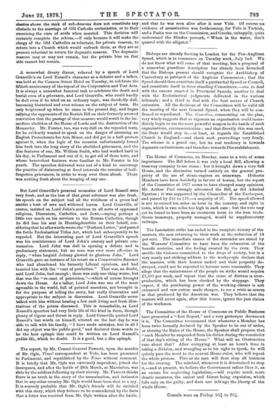But Lord Granville's personal memories of Lord Russell were very
fresh, and as the loss of that great reformer was also fresh, Ms speech on the subject had all the vividness of a green leaf -amidst a host of sere and withered leaves. Lord Granville, of course, insisted on Lord John's services to all sorts of oppressed religions, Dissenters, Catholics, and Jews,—saying perhaps a little too much on his services to the Roman Catholics, though he did lose his seat in Huntingdonshire on their behalf, con- sidering that he afterwards wrote the "Durham Letter," and passed the futile Ecclesiastical Titles Act, which had subsequently to be repealed. But the interesting part of Lord Granville's speech was his reminiscence of Lord John's oratory and private con- versation. Lord John was dull in opening a debate and in preliminary statement, but no man was ever more effective in reply, "when languid Johnny glowed to glorious John." Lord Granville gave an instance of his retort on a Conservative Baronet Who had abandoned his formerly Liberal opinions, and had taunted him with the "cant of patriotism." That was, no doubt, said Lord John, bad enough ; there was only one thing worse, but that was the "re-cant of patriotism,"—which of course brought down the House. As a talker, Lord John was one of the most agreeable in the world, full of pointed anecdote, not brought in for the purpose of telling the story, but really illustrative and appropriate to the subject in discussion. Lord Granville never talked with him without hearing a few such living and fresh illus- trations of the points discussed. This is remarkable, as Lord Russell's speeches had very little life of this kind in them, though plenty of vigour and thrust in reply. Lord Granville quoted Lord Russell's last words on himself, uttered on the last day he was able to talk with his family, " I have made mistakes, but in all I did my object was the public good," and declared those words to be the best epitaph that could be written on Lord Russell's public life, which we doubt. It is a good, but a dim epitaph.


































 Previous page
Previous page